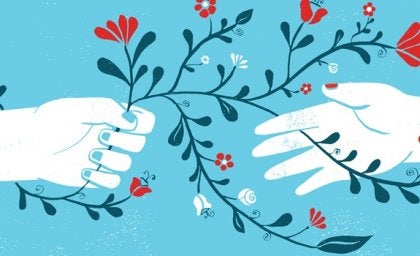The world needs more compassion and less mercy
. However, most of us simply feel sorry for ourselves, that passive feeling for which we merely feel sadness for those in need, for those who are forced to leave their country, for those who live to the last degree of our society. However, the compassionate is the only one who assumes an active feeling, the only one who does everything possible to reduce the suffering of others.
- One thing that is curious in our daily lives is the great discomfort that awakens the word “compassion”.
- No one likes to arouse compassion.
- For example.
- Because it shows a certain disadvantage.
- A certain dimension that does not place us at the same level of opportunity as others.
- However.
- Transcendence changes if we refer to this term in a Buddhist context.
“The penalty costs nothing, but it’s not worth anything either. We need more compassion. –Josh Billings–
In the latter case, compassion is an exceptional tool that allows us to achieve several things, the first is to see the world from a more human, loving and sensitive point of view, in addition there is a genuine commitment to want to alleviate this pain, to do everything possible to repair this inconvenience.
On the other hand, we also have an indispensable dimension, which is undoubtedly self-pity. We must also be proactive with our own needs and needs.
In short, it is not enough to feel sorry, look who is suffering and simply put yourself in your place for a few moments to share your sorrows, then walk away to forget from a distance, we need action, will and commitment to others, but also to ourselves, to the internal reality that we sometimes neglect and ignore.
We often overlook the great psychological implications of certain terms. So the word?Pen?is hidden in its two curious and striking silabic dimensions. In this way, there are those who might say, for example, that when we feel this emotion, we apply the most basic empathy: we are able to connect with the suffering of others, we know that it hurts. , makes us suffer, and what is the impact on your personal situation.
However, feeling sorry for someone is not just empathy, we also apply a sense of superiority. There is evidence that separates us from the other: it can be the status, culture, economy and even physical distance of our species when we feel sorry for an animal.
On the other hand, we have compassion, that word that already gives us a clue as to how it works, this word comes from the Latin ‘Cum passio’ and could be translated as ‘Suffering together’. Or manage emotions together. As we see, here distances are removed to establish a relationship of equality, in which one engages with the pain of the other, but with a very clear goal: to commit to it to improve its situation. We conclude that compassion responds to the confluence of three basic elements:
Empathy is not the same as compassion, most of us have empathy for the emotions of others, however, this connection does not always lead to mobilization, passion also means presenting a mobilizing feeling, an action that begins with emotions, but seeks a specific goal. : improve each other’s situation.
The world needs more compassion, more people who not only contemplate the pain of others, but use the means (according to their means) to generate positive change, yet, as we said at the beginning, this word still has a somewhat complex meaning. and uncomfortable implications in our vocabulary. We don’t like people pitying us. Most of the time, we even hesitate to get help from others.
However, as several scientists explain in a study at the University of Berkeley (California), we must be able to find this “primal instinct”. Compassion would be the natural and automatic response that would allow us to survive as a species.
It has been shown that two- and three-year-olds show compassion for other children without any reward, it is a reaction, a type of response that unfortunately tends to disappear over time in many cases because of our social conditioning.
Curiosity and, in conclusion, it is worth noting the information pointed out by Dr. Dachner Keltner, from the aforementioned study of the University of Berkeley. The famous phrase “only the fittest survive”, attributed to Charles Darwin, is not, in fact, the famous author of The Origin of Species. This idea, this phrase, was said by Herbert Spencer and the social Darwinists, who wanted to justify the superiority of class and race.
Charles Darwin pointed out something very different, in fact, as he explains in his texts, the societies that apply the most compassion are the ones that are most likely to evolve. In his own words: “Social or maternal instincts like compassion are better Communities with more compassionate members are thriving more because it promotes the survival and development of our species.

